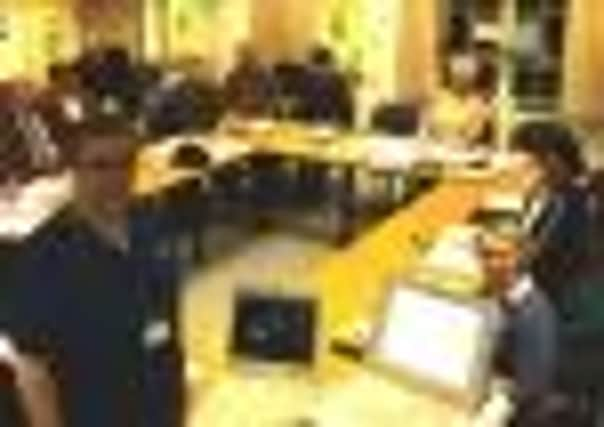Friends approve new gifts for two local hospitals


That is the speed at which a condition known as wet macular degeneration can strike.
The condition accounts for 90 per cent of all new blind registrations and affects older people in particular.
Advertisement
Hide AdAdvertisement
Hide AdConfronted by such statistics, the general committee of the League of Friends of Bexhill Hospital had no hesitation last Thursday evening.
They voted £55,000 to buy a Humphrey Cirrus non-invasive laser for the ophthalmology department at the Conquest Hospital, where elderly Bexhill patients make up a high proportion of the ophthalmology department’s heavy case-load.
An evening which began with a photo-call and presentation to thank the League for £48,000 worth of equipment previously given by the league for the outpatients’ department at Bexhill Hospital culminated in the committee voting to spend a total of £72,509 on equipment to benefit Bexhill patients.
Consultant ophthalmologist Peter Giouws said purchase of the Humphrey Cirrus laser would benefit eye patients by providing high-resolution cross-sectional pictures of the retina and optic nerve. The device would produce high-definition 3D scans.
Advertisement
Hide AdAdvertisement
Hide AdThe machine, an update on the model currently on loan from the manufacturer, would be the backbone of a modern wet macular degeneration treatment service locally.
It would help speed diagnosis of age-related macular degeneration, aid the screening of 20,000 diabetic patients a year and 12,000 glaucoma patients.
The meeting also agreed the purchase at a total cost of £550 of two Action 2 self-propelled wheelchairs and one manual attendant wheelchair for the physiotherapy team using the Egerton Rehabilitation Gym at the Conquest.
The wheelchairs would assist the work of acute rehabilitation in the Department of Elderly Medicine who provide services for amputee and neurological patients.
Advertisement
Hide AdAdvertisement
Hide AdPurchase of an Orbi Turn patient transfer disk at a cost of £268.45 would enable the same team to transfer patients from point to point if able to stand but unable to walk.
Surgeons working in the Conquest’s operating theatres needed a specialised operating stool capable of being raised or lowered with the feet without the surgeons de-sterilising themselves, to enable them to undertake fine surgical work while seated. The meeting agreed the purchase not of one as requested but two at a cost of £795 each.
The League recently agreed the purchase of an Ultrafin hydraulic legging system for the Conquest operating theatres. The meeting agreed the purchase of a further device at a cost of £5,143 for use in the obstetrics theatres.
The easily-adjustable lifting device minimises pressure on the patient’s calf nerves during operations and reduces the amount of manual handling for theatre staff.
Advertisement
Hide AdAdvertisement
Hide AdIt also agreed at a cost of more than £10,000 the purchase of a Nidek ARK-510 computer-controlled device so optometrists doing eye examinations can determine refractive error accurately in order to prescribe the correct lenses.
Senior chief cardiac physiologist Sean Gaughan is so delighted with two pieces of electronic diagnostic equipment that the league recently purchased for Bexhill Outpatients’ department that he brought both along to show the committee and to thank them (pictured).
A scanner image of a patients’ heart was beating the ultra-sound machine’s screen as he told members: “So many patients tell us how happy they are to come to Bexhill Hospital. It is just the convenience of it.”
Thanks to the league, both machines can be linked to the hospital network, enabling consultants to view data on the patient’s heart function when they see them at clinics.
Advertisement
Hide AdAdvertisement
Hide AdTreasurer Robin Barnett revealed that his report to the league’s annual meeting in the Health Centre at Bexhill Hospital on Wednesday, April 13 would show that league gifts in the past year had hit a new record.
The charity invested £488,500 in improving services for local patients.